Do you have a senior dog? Most people understand that a senior dog needs special care. But do you know what that special care is? Do you know how to keep your senior dog as comfortable as possible as they age? Learn these tips on how to care for your senior dog. Following just a few steps can make your dog’s senior years, their golden years.
Is your dog starting to show signs they are entering their senior years? If you have had your best fur friend since they were a pup, then I’m sure you have spent years making special memories together. You are probably with each other every day. Because of this, you may not notice, or maybe don’t want to notice, the small, slight changes that are signs your pooch is getting older.
Helping to care for our pets as they enter their senior years is very important. You would do anything for your fur baby. By knowing what to look for and taking a few steps, you can help make your senior dog as comfortable as possible for many years to come.
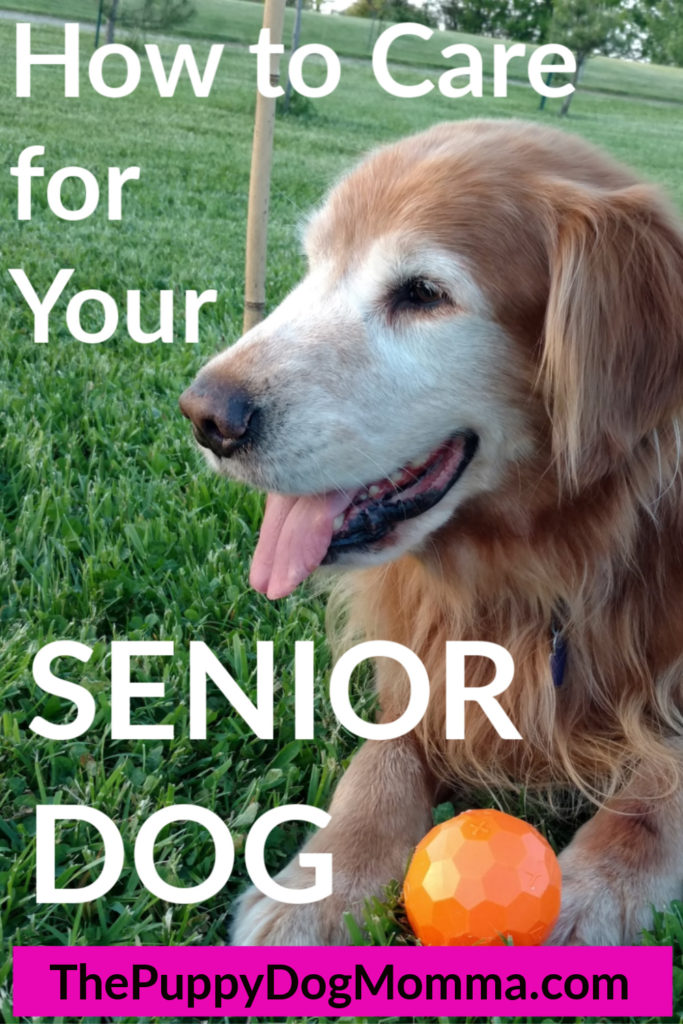
Please share this article on Facebook and Pin to Pinterest!
When does a dog become a senior?
First, you need to know if your dog is a senior yet. According to PetMD.com, “It really depends on the individual dog. In general, giant breed dogs age faster than smaller breed dogs. A Great Dane is considered to be senior by roughly 5-6 years old whereas a Chihuahua would likely only be middle-aged then, and probably not considered a senior until 10-11 years. Large breed dogs fall somewhere in between. A Golden Retriever might be considered senior by 8-10 years of age. Genetics, nutrition, environment; all of these play a role in how fast your dog ages.”
The Puppy Dog Momma is a participant in affiliate programs including Amazon Services LLC Associates Program, affiliate advertising programs are designed to provide a means for sites to earn advertising fees by advertising and linking to reputable companies including Amazon.com.
Increased Vet Checkups For Senior Dogs
The most important thing you can do for your pet is to have good communication with your vet. This is from the time they are puppies to their senior years. However, finding the perfect vet isn’t always easy. Make sure your vet can meet the needs of your senior dog.
As your dog ages, many vets suggest increasing checkups from once a year to twice a year. Your vet will listen to your dog’s heart and lungs, check their eyes and ears, feel their abdomen for possible masses and check their joints. In addition, to a full physical, your vet will probably do blood work. The blood work can show if your pet is having kidney issues or diabetes, as well as other health issues.
Senior Dog Food
As your pet ages, their dietary needs may change as well. If your dog has any cardiac or kidney disease, it may be important for your pooch to be on a lower sodium diet. If your dog has any dental issues, softer dog food may be needed. Many brands of dog food have a senior dog version. If you have a brand you like, discuss with your vet to make sure the senior version would meet your aging dog’s needs.
We use Chewy.com to have our senior dog food delivered directly to our house. Chewy hase 1000’s of brands of dog food available. You are sure to find a brand of dog food to meet your senior dog needs.
Weight and Exercise As Your Dog Ages
Just as it’s important for humans to maintain a healthy weight and to exercise frequently, the same goes for your pooch.
Overweight Senior Dogs
Excessive weight is hard on joints. If your dog is overweight, you might want to consider a dog food that is lower in fat. You can also give your dog a variety of healthy dog treats that you can purchase or make yourself. This can help with weight loss, but it can also help to stimulate your senior dog’s decreasing senses.
Exercising Your Senior Dog
You might notice that your pet can no longer take long walks. However, regular exercise is still important for your pets. If you don’t normally take your dogs on five-mile runs, don’t start now. You can’t make up for t
Joint Pain in Senior Dogs
If you are seeing some signs of doggie joint pain, such as your dog having trouble getting up and moving slower, there are several things that you can do to help reduce their discomfort. First, speak to your vet.
Joint Supplements for Senior Dogs
When visiting your vet, discuss if doggie joint supplement would benifit your senior dog. There are supplements that have shown to help with dog joint pain. Glucosamine and chondroitin supplements, in addition to CBD oils, have been reported to help.
Dog Beds
Where does your dog sleep? If not in bed with you, then they really need a good orthopedic bed as they age. Ever wake up after sleeping someplace hard and uncomfortable? You probably felt it was hard to walk afterward. Think of how your pooch feels if they are sleeping on the floor. An orthopedic dog bed can do wonders for your senior dog’s joint pain.
Add Carpet Runners
Do you ever see your dog slipping on your hardwood or tile floors? Slipping can cause your fur baby joint pain. Add carpet runners in the common walkways. This will give your dog traction as they walk through the house. When our golden, Copper, started having trouble with his back end, we had runners all through the house. It might not have looked the greatest from a décor standpoint. But I didn’t care, my dog comes first. Nowdays, they have really cute patterns for carpet runners.
Keep Your Dog’s Nails Trimmed
Keeping your dog’s nails trimmed will help with slipping on floors and walking. As my dog Copper aged, his nails were very thick. Because of this, I was no longer comfortable clipping his nails myself. If you’re not comfortable, make sure to have it done when going to the vet and/or groomer. Luckily, there are several nail trimmers available to use on your dogs nails.

Stairs and Ramps for Dogs
Like many of you, I let my dogs on my furniture and in my bed. But if your dog needs help getting up on places, there are several things on the market to help them with just this sort of thing. There are doggie steps that you can get to help your pet get up on the couch or bed. You can also get doggie ramps that will help your pet get up into your car or RV. A doggie
Dog Bowls
Elevated dog bowls are a great assisted device for your dog. There are many things that can cause weight loss in a senior dog. Don’t let t
Dental Care
Issues with a dog’s teeth can also be a reason your dog isn’t eating well. Dogs can get sore teeth and gums, tooth loss, and even periodontal disease. Bacteria from this can cause other health issues such as heart and kidney disease. Some of the symptoms of tooth issues can be lack of appetite, bad breath, a buildup of plaque, and inflamed gums.
Brushing Your Dog’s Teeth
Starting routine dental care on your dog at a young age is the best. However, it’s never too late to start dental care. And yes, you can brush your dog’s teeth and should be doing it daily. They even sell beef flavored toothpaste.
I admit, brushing my dog’s teeth isn’t something I used to do regularly, really, not at all. Because of this, my boy Copper had to get a professional cleaning at the vet which required sedation. My vet did a great job and he was fine. However, investing in a doggie toothbrush, toothpaste and a little time would have been much cheaper!
Dental Chews
If brushing your dog’s teeth isn’t for you, or your dog doesn’t like it, there are special senior dental dog chew treats that are made to help keep your senior dog’s teeth clean. But if your dog is already having dental issues, look for softer chews. You should also consider softer toys as your pet becomes a senior.

Vision
As a dog ages, their eyes also age. Dogs can experience a decrease in vision, cataracts,
Decreased vision in Your Dog
If you notice decreased vision, keep lights bright around your dog. If your dog no longer wants to go out after dark, this could be related to decreased vision. Our girl, Callie, would never go outside when it was dark. This made things hard during the winter when it would get dark so early.
Also, approach a dog with vision problems slowly. Sudden movement can startle your dog and cause them to be frightened.

Changes in Behavior
My girl, Callie, not wanting to go outside could have been a vision issue. But it might have been caused by a behavioral change.
Dog Dementia
Many people may not know it, but dogs can get dementia similar to humans. They can even get something a lot of people with dementia have called “sun-downers”. They are behavior changes that occur mostly at night but are improved during the day.
Dog Anxiety
Some dogs will also have an increase in anxiety. Your senior dog may have new issues with being separated from you. Some dogs are afraid of storms. This fear could become worse as your dog ages. If your dog suffers from anxiety, speak with your vet. There are medications that may help. CBD oils has also been shown to help. You might also want to consider getting your pooch a thunder vest.
Dog Incontinence
Your senior dog may start to have incontinence. This could be from confusion, decreased senses, or your aging dog might not be able to hold it as long as they used to. Frequent potty breaks can help this. You may need to start using doggie diapers.
However, if your dog is having incontinence, they could be having bladder or kidney issues. Talking with your vet is something you must do if you see this change in behavior.
Dog Aggression
Changes in a senior dog’s behavior can present itself in many ways. However, if your dog suddenly shows signs of aggression, this is something you should notify your vet about right away! This could be from pain or being
Mental Stimulation
To keep your pet’s mind sharp, provide lots of stimulation. This can be done with lots of human and dog socialization but also with play. You can provide your dog with stimulating toys and doggie puzzles. This is something that you can start when your dog is a puppy and continue to provide throughout your dog’s life.
Loving Your Senior Dog
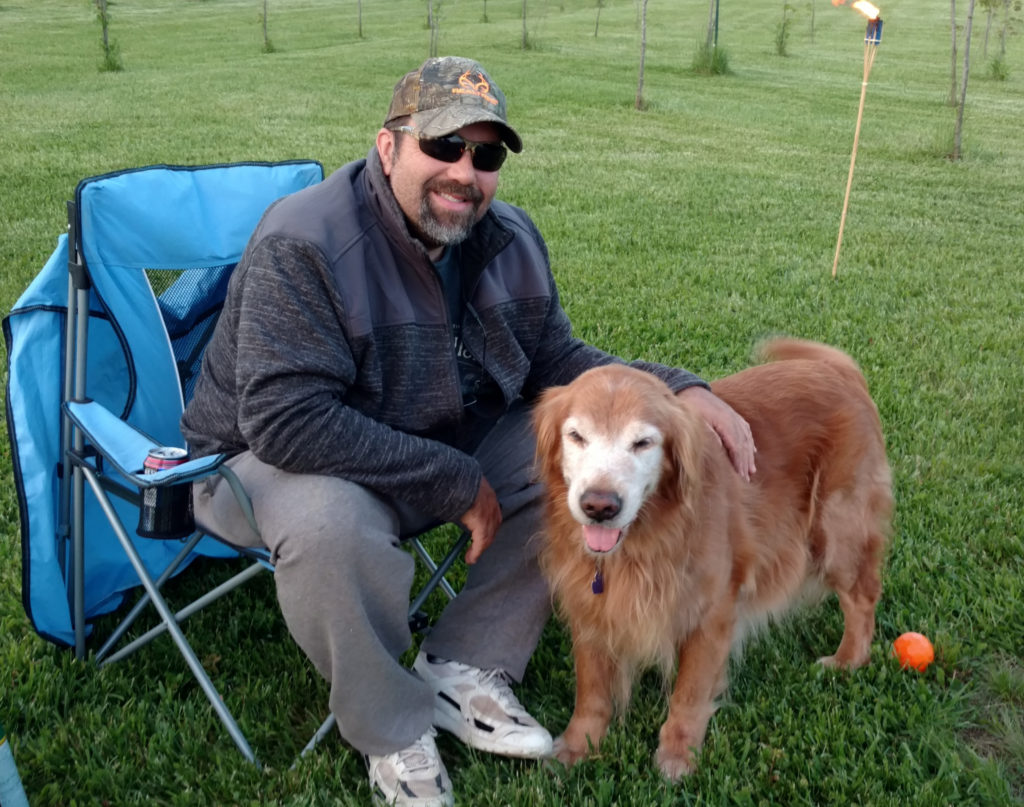
No matter if you got your dog when they were a puppy, or your dog came to you later in their life, every moment with them is a blessing. As a dog owner, you want to provide them a long happy and healthy life. Following a few steps and keeping good communication with your vet will ensure that as your dog enters their senior years, they will be their golden years.
Please share this article on Facebook and Pin to Pinterest!
What ways do you help your senior dog? Show us a picture of your senior dog!
Check Out these other GREAT Articles to provide care for your senior dog!
- Dog Joint Care, Causes, Prevention, and Treatment
- Top Orthopedic Dog Beds
- Simple and Easy Homemade Dog Treats
- How to Choose the Perfect Vet for Your Pet
- Best Mental Stimulating Dog Toys
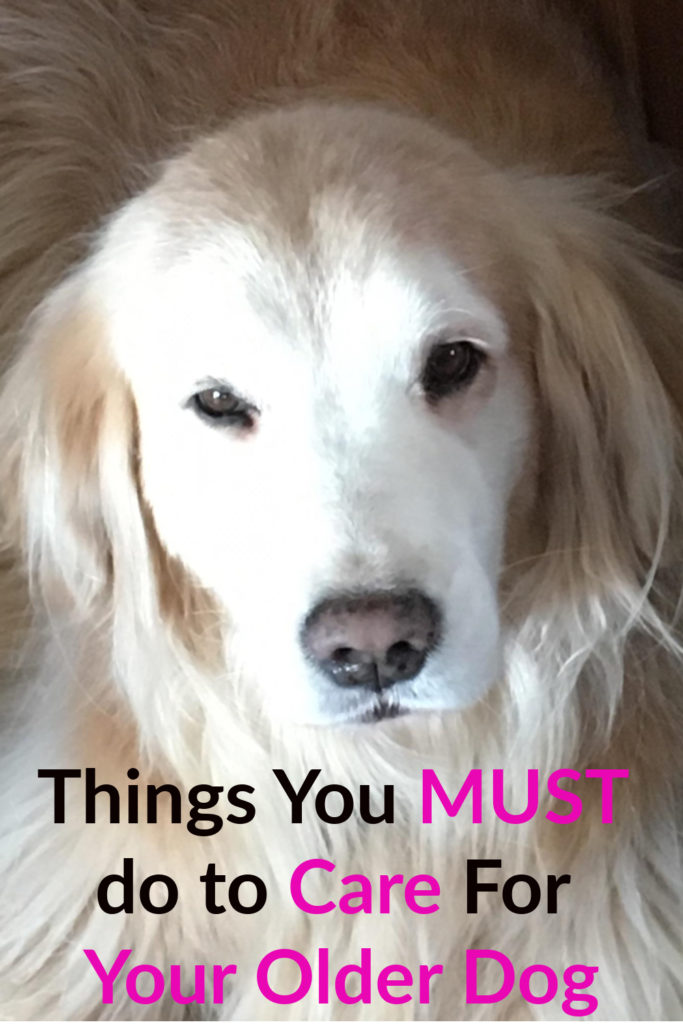




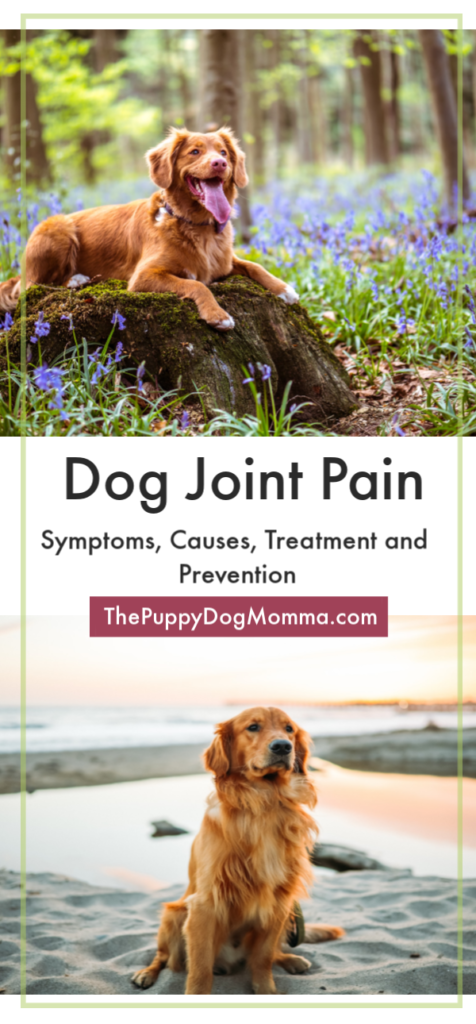




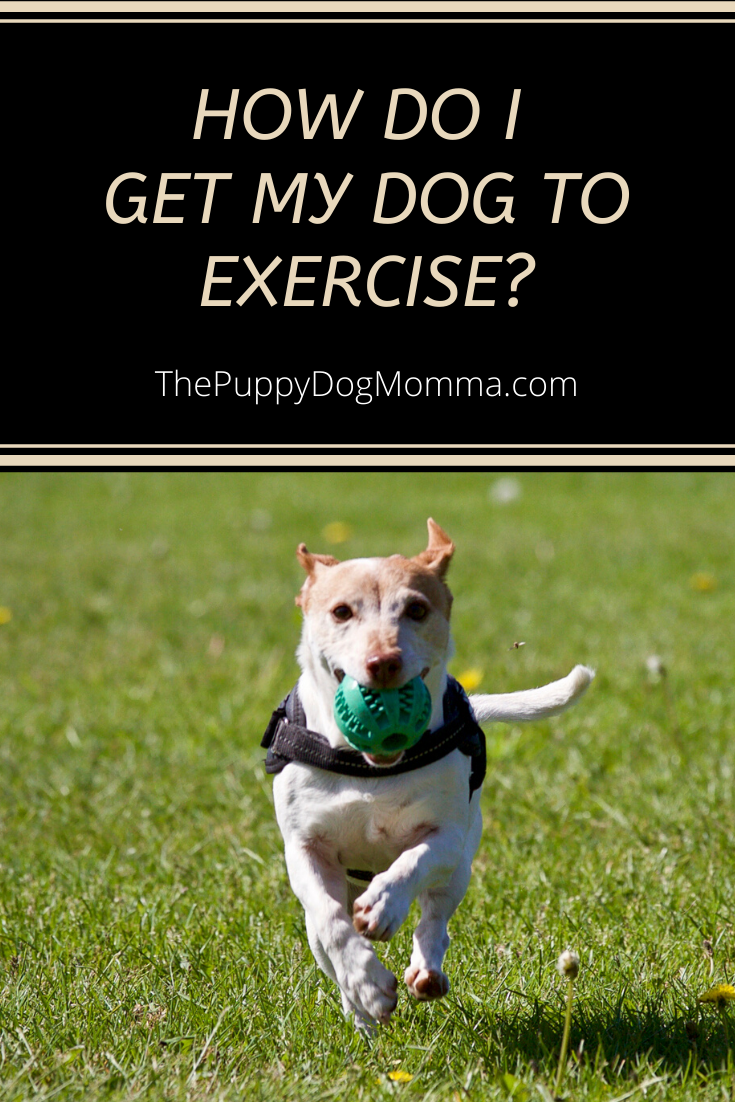
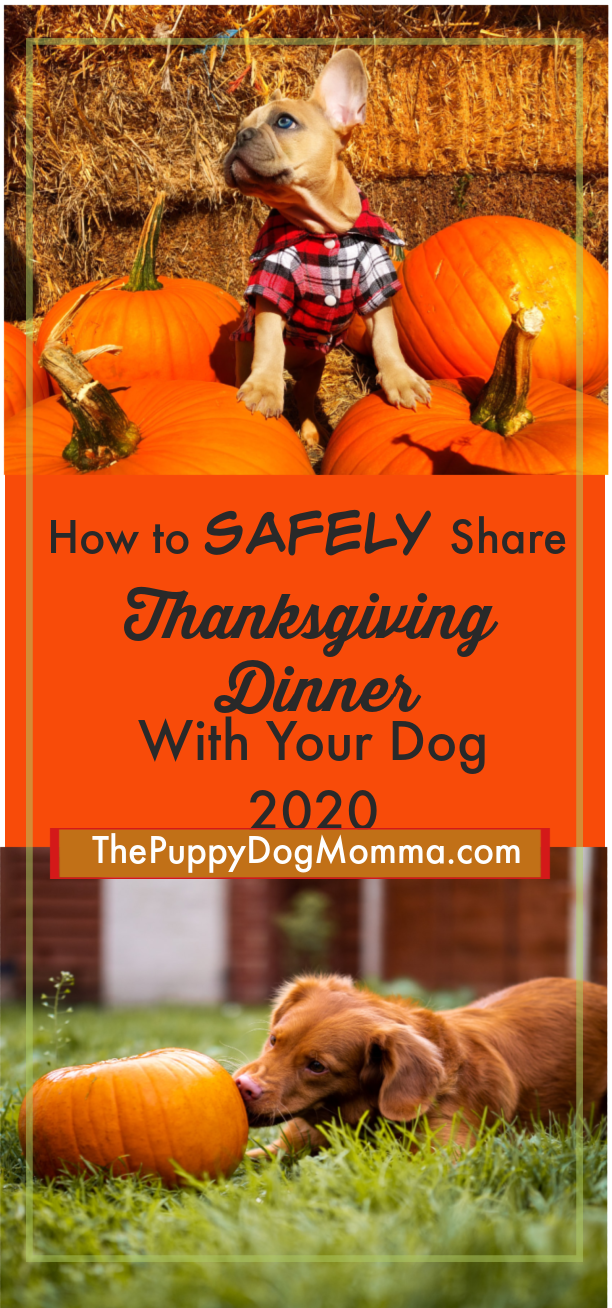

I like your site .
You forgot the most important problem at this time of year
Fleas
Hi Marlene,
Your right, flea treatment is very important! Look for a future article where I will be addressing this topic. I’m glad you like the site! Thanks